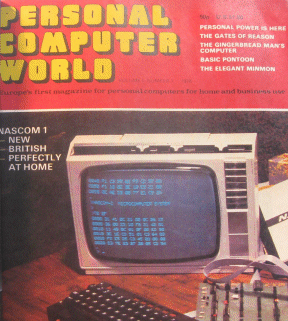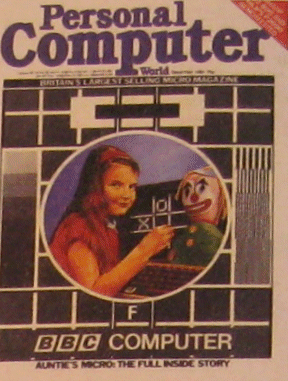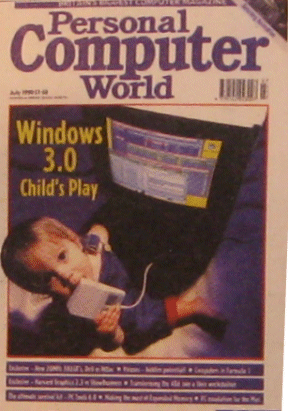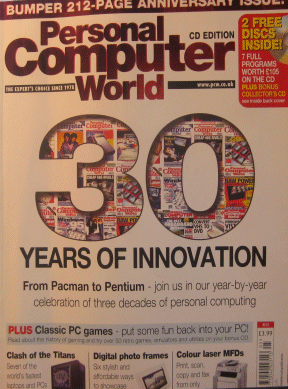Today I learned that Personal Computer World is to cease publication. This is a long-established UK magazine to which I have been a contributor since May 1993. For PCW, that counts as its latter days. Today you might think that the PC in the title means “PC rather than Mac”, and perhaps in a way it does, but that was not the case when the first issue appeared in 1978, for obvious reasons (the first IBM PC did not appear until 1981). No, the computer on the cover of the first PCW was the self-assembly and long forgotten NASCOM 1.

Although the cover stated “Europe’s first magazine for personal computers for home and business use”, PCW was really an enthusiast’s publication; and in those days being a computer enthusiast meant being relatively technical and willing to do your own programming.
The story of personal computing is about how these devices evolved from a geeky hobby into a tool and plaything for everyone; and the magazine morphed accordingly, becoming steadily more mainstream as time went by.
The early years were particularly engaging, thanks to the variety of new devices that appeared and disappeared with bewildering speed. Some had more staying power than others, like the 1981 BBC micro, for example:

One of my favourite PCW covers was that for Windows 3.0 in 1990. Sub-titled Child’s Play, it was prophetic in identifying how Microsoft’s OS would bring personal computing to the masses.

It was Windows which inspired my first piece for PCW, a massive survey of 17 Windows database managers in May 1993. Not long after I reviewed Visual Basic 3.0, correctly predicting that its built-in data access would make it popular in businesses. I went on to do a series of Visual Basic tutorials, and then a programming column that evolved from Visual Basic to all things related to software development.
Last year PCW celebrated its 30th anniversary.

So why has it ended? According to this Press Gazette post:
Managing director of Incisive’s professional services division Graham Harman said … "Sadly, no amount of hard work or innovation was going to turn around the structural decline in advertising and newsstand sales. The depth of this recession and the ease of access to information online has only served to accelerate the long term downward trend within this particular sector.”
PCW’s last published circulation figure (Jan-Dec 2008) was 54,000, which is respectable, and more than double that of some rivals, like Future’s PC Plus which recorded just over 22,000 for the same period. The bigger problem, as you will see if you browse through a recent issue, is the decline in advertising. Before the days of the world wide web, magazines like PCW were critically important to computer manufacturers and retailers, but that is no longer the case.
Another problem, as one of the editors explained to me a few years back, is that PCW found itself caught between the demands of an aging readership which had grown up with the magazine, and that of a new generation.
It still has a considerable reputation and I’m surprised that the publishers have not found a way to make it work for a little longer, though the long-term trends have been against it for years.
Still, it has had a good run, and no doubt future researchers will have a lot of fun going though its archives as they explore the days when computing became personal for the first time.
Thanks for that thoughtful (and accurate) summary, Tim. PCW has certainly been a labour of love for me since I joined it as deputy editor in 2003.
Kelvyn Taylor
Editor, PCW 2007-2009
As a long(ish) subscriber of PCW I’m very sad to hear that it’s ceasing publication. I admit that I still found the columns and editorials to be of great interest and will be sad to not receive my monthly update.
I am certain those employed it it’s production and it’s contributing writers will find replacement work in no time but I’m not sure that any one internet site will replace it for readers.
There goes a bit of my childhood.
A sad day indeed but like all magazines they created extra cost by carrying CDs and DVDs when content was readily available on the web.
I hope however it can in some form make a comeback, but in the meantime the other stalwart PC Pro will have to hold the fort.
After Byte, PCW was my favourite magazine. It’s sad to see it go.
Looking at a similar market, Germany, where there are lots of cheap magazines costing < 3€, some as little as 1€. They don’t bother shipping CD/DVD-ROMs. I wonder why there aren’t any similar magazines in the UK. I find it very irritating that I often have to pay 8-9€ (in Ireland) for a magazine, even when I don’t want the DVD.
Unfortunately, as many newspapers and magazines have discovered, once you’ve started giving away cover gifts, it’s almost impossible to stop them without taking a signifcant hit in newsstand sales. Even unlikely titles like The Economist have started using the odd freebie to entice in readers – it’s tough out there.
We did publish a limited version without a disc for almost a year in 2005 – very few people bought it.
The problem in the end was exactly as stated by Incisive – lack of advertising and the fact that people are buying fewer magazines, and not renewing subscriptions when they expire.
It’s certainly not just PCW that’s affected – check out the number of ad pages and the issue sizes of our rivals – they’ve all taken significant hits over the past 6 months.
Kelvyn
Hi,
I remember buying issue 1 and it inspired me to build a uk101 so in many ways it started my interest in computing and my career for the last 25 years. Though in the last few years I have been buying PC PRo it is really sad to see it go.
What a shame
Martin
This is sad news indeed. The end of an era…
I recall buying PCW when I was 11; Tim’s covers are very familiar to me!
As a long-term subscriber, I will miss PCW landing on my door-mat – it made a welcome distraction from the feverous rush of the on-line space. It could be read without the ring of e-mails, tweets and IMs echoing through each article, paragraph, sentence and word.
Times are hard, PCW has thinned down somewhat over the last few months. Adverts, as Tim notes, became few and far between. Since it is adverts that form a major part of the income for a magazine, the drop in advertising hurts. Of course, there’s a element of irony here: a lot readers complained about magazines (not specifically PCW) being full of adverts… PCW, IMHO, had the line just right, not too many and not too few: articles could be read page-by-page, unlike some other magazines whereby a 3-page article might be spread over 12-15 pages riddled with adverts.
Whilst I will be saving £9.50 every few months in subs, it’s a shame to see PCW go…it has 30 years worth of heritage behind it. It was, IMHO, the cornerstone of the PC space well into the late 90s when the on-line world took off. Even after the late 90s, PCW did well to re-invent itself to stay competitive.
Good luck to the Editors and Authors, no doubt we’ll continue to see you all on-line in the future!
Craig
Sad days indeed – I was DepEd in the late 1980s – I liked to think of them as glory days – until the Great Strike of course….
Commiserations, Kelvyn et al. See you in the Blue Posts?
Manek
I appreciate wht Kelvyn says, but someone on a newstand is likely to be excited by whats on the cover disc, maybe to fulfill a need of some kind; however subscribers were never given that option to reduce the cost of their commitment. This may have pushed some not t renew. Is there no way PCW could go to the digital as per PC Magazine in the US – http://www.pcmag.com/article2/0,2817,2335009,00.asp .
Anyway bottom line is I’m going to miss PCW!
Very sad. My second magazine job was at PCW. I forget my title, but I was there from 1985 to 1988. But they are all going. I don’t think PC Pro will hang on much longer – not even PC World in the US. I’ve worked directly (on staff) for seven computer magazines over a twenty year period and only one of them is still printing. One more is alive as a web only publication. Neither of them is particularly healthy. The rest are gone. RIP Creative Computing, PCW, Computer Currents, BYTE, Windows Magazine.
PCW has been a great place to work; I’ve been freelancing there since 1995, and actually had a listing published back in the 1980s, so it’s been a significant part of my life, both growing up and professionally.
Kelvyn and the rest of the team have all been wonderful to work with, and though freelance it’s often felt like my home.
Naturally, I’m biased, but I think it was a great title, and though there are things you can find elsewhere, and on the web, I still don’t think the online world is quite as good when it comes to some of the in depth features that PCW has been able to run, making new ideas and new areas of technology more accessible to people.
Nigel Whitfield
Contributing Editor, PCW.
I wrote an article for the first issue; and I hope they pay me for the article I wrote for the last, come to that. There was a gap when I went off to PC Mag UK, before I rejoined.
My analysis: if Private Equity hadn’t loaded Incisive up with so much debt that it couldn’t service, PCW would still be going. No, it wouldn’t be highly profitable, but it would cover its costs until advertising recovered.
Ah well; end of an era. Those few who remember my contributions have lost their last channel in which to read them. Personally, I find this drearily tragic! From an industry point of view, just dreary.
Sometimes, I think unspeakable thoughts, such as: “I wish publishing management, in general, recruited from the more competent members of our society…”
But really, it doesn’t do to say that sort of thing if you want to sell stories to publishers. So I won’t…
As everyone has said, its a sad day, and it was an important part of my career for 10 years or so. I know awards are mere frippery, but the newes makes me feel strangely warmwer towards the two columnist awards I won writing for it.
But maybe it is just a mark of the progress that has been achieved by the technology as it becomes not just mainstream but subsumed by what it is used for. I remember renowned hack of old, Rex Malik, saying that when refrigerators first appeared there were newstand magazines on how to use them – same with Microwave ovens. Maybe it just took the `PC’ to achieve the same end.
It is what the technology is used for that is important now (celebrity chefs use fridges but don’t go on about them), not the technology itself. Operating systems and applications are going the same way as `services’ take over.
And the earlier post just shows that, even after all these years, I STILL need a good sub-editor……..
A sad day indeed. It was my first editorship and a very exciting one as well. I most remember the cover shoots – Sir Clive’s Z88 with a chimp on a bike (the Z88 we used was a wooden prototype); a snarling cheetah guarding one of the first Dell’s in the UK; taking a Toshiba notebook apart to photograph the inside and the engineer going pale when he announced it was the only one in the country and they were assembled in a jig…
And then all the journalists at VNU got sacked just before Xmas 1988 (I believe). 20 years later the full impact of that decision runs its course.
It’s really hard to produce high quality editorial content (which is what the readers buy the mag for) in the face of falling ad sales, often better and timelier content on the web and a top management structure which is rarely populated by those with an editorial background and understanding.
Yet again the suits have won (or is that lost)?
If we have a reunion in the Blue Posts will Richenda be there with the strike pay?
Although I’m biased, I don’t think dropping the disc would have saved much from the RRP. People do not realise that this is a relatively low-cost option and even the lowest ABC PC magazines still include a disc.
Indeed, I think we punched well above our weight with the quality of the full world exclusive applications on PCW and this lead to the magazine having a staggering 13 international disc-based (yes, disc-based) licensees by October 2008. This is and was unheard of and brought in a great deal of additional revenue. You’ll note I say ‘by’ October 2008. Doesn’t take too much to figure what happened since October 2008.
Problem is that some of our websites are more popular than PCW and rival magazines. If you have a tech website that can attract a few million monthly visitors, this is going to attract the advertising – companies are more likely to partner you online than in a magazine.
Now we all have to find other alternatives, ASAP!
Chris.
Interestingly, BBC Four has been here recently digging through the PCW archives for material & props to use in an upcoming drama about the British computer industry between 1978-1984, largely featuring the spat between Clive Sinclair and Chris Curry over the BBC Micro.
@derek: it was 1989…
End of an era – I remember writing for the mag in the late 1980s and it was great fun, looking at all the new gizmos that Derek and Manek had at their disposal.
Sign of the times I guess 🙁
I’ve just checked the PCW website and they’re still inviting subscriptions! What’s going on?
If you click the subs ad, you’ll see that it’s no longer available from the subscription service.
The actual placement of ads on the web site itself isn’t something that’s controlled by the editorial team, who in any event have been a little shellshocked the last couple of days.
..So sad, As a long term subscriber I will miss this landing on my doormat.
Good luck to all the contributors and editors whose reviews and features have made it a good read.
I agree with most of what has been said about the demise of PCW. But what I would also like to say is that, although the quality of the writers is beyond doubt, the subject material they wrote about was becoming, to me anyway, rather obscure and remote.
Gordan Laing especially, seemed to be writing articles close to his heart rather than for the readers, his latest thing being sound quality from the PC, and I have to say that most people I know do not want to mess about with the insides of a pc, or build something themselves, they just want them to work.
Ken McMahon would not consider any software to do with digital imaging which didn’t have the word Adobe on it. The best?, we wouldn’t know as any other software hardly got a look in.
Visual Programming, Web Development, Databases, Spreadsheet and networks all important sections of the computer experience, but not that kind of thing an everyday computer user would be bothered with.
If PCW could have evolved into a general computer consumer mag …. along the lines of Stuff, What Video and Tv, that type of thing rather than banging on about overclocking and scripting or macros it may have had a chance.
I’ll repeat what I said earlier, people want a well informed magazine yes, but not many people want to be bothered with overclocking the CPU or upgrading a bios, anything that necessitates delving into the innards of a computer case, they just want computers to work.
V. sad to see PCW go – I don’t think it would be an exaggeration to say that my PR career owes a lot to the contacts and relationships I formed with PCW writers from 1989 onwards. My first ever tech press launch was for Borland’s Quattro Pro – where I first met Guy Kewney and Manek Dubash. I went on to know many others via PCW including Guy Swarbrick, Rupert Goodwins, Nigel Whitfield, Dr Mark Whitehorn and many others.
I remember the VNU strike well. I worked in Golden Square, a stone’s throw from the PCW offices. What better way to build press relationships than to buy beer for striking journalists in the Red Lion in Kingly Street?
It was also through PCW that I discovered CIX – and it was a Jack Schofield PCW column that made reference to myself and Frank O’Mahoney of Apple as the first PRs to use e-mail to send press info. Getting Borland on the front cover of PCW was always seen as a PR triumph.
So, farewell PCW – a sad time, but your place in history is secure.